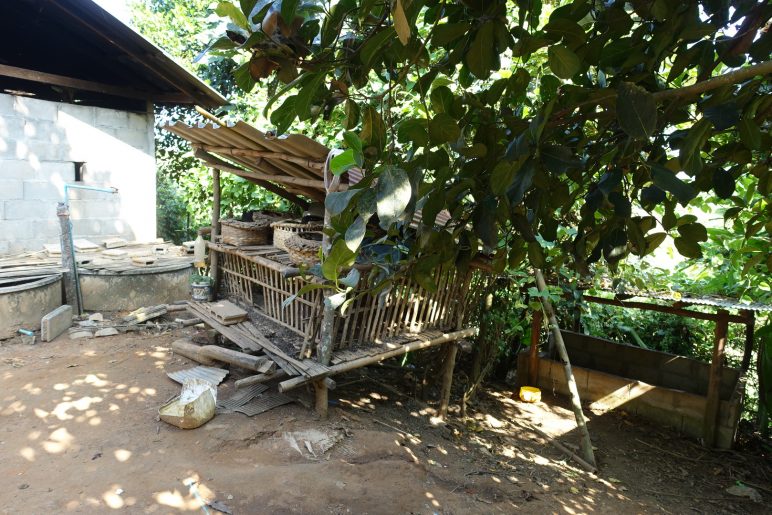Our thoughts and values guide our everyday life and decision we make. The same applies to farmers and pastors.
“You’ve never been a farmer so you may not know, but that tiny piece of land of his could never have anything good grow out of it!” said a pastor to our project staff, Pui Shan, after visiting an impoverished Palaung family in northern Thailand and saw their backyard. If you were that farmer, you might not want to pick up that plow again after hearing the pastor’s words.
But our partner in northern Thailand, Upland Holistic Development Project (UHDP), sees things differently. They believe that as part of the resources given to us by God, no piece of land is too small for us to manage and utilise. For if someone dedicates time and effort, even a backyard smaller than a classroom could be cultivated well enough to support a family.
UHDP saw the dilemma in the lives of the Palaungs of Myanmar origin. Despite living in Thailand for more than two generations, they were barred from enjoying basic rights such as land ownership due to the complicated citizenship registration process; consequently, leading to their lack of proper residency status. They were unable to own and develop their own farms, and where and what they could do for a living were also restricted. But like everybody else, they still had to pay their bills and keep their children in school.
Before UHDP’s intervention, the Palaungs used to overlook the small piece of land next to their house as other outsiders did, they thought the only way to feed their families was to look for outside work and buy food with the money they earned. With our partner’s help, they started to grow vegetables, rice, and rear livestock like chickens, pigs, and fishes in their yards. The produce of the small gardens have helped villagers to reduce their spending on food and improve their living conditions as they could spend the saved money on other daily necessities or to support their children’s education.
 “At first, I was sceptical if we could grow vegetables in our backyard, so I was just giving it a try. I was very surprised when the produce turned out fresh and delicious! My family was living in poverty, so I wasn’t able to go to school, but now the money we saved could support my younger sister’s education. I hope she could study hard and carry with her my unfinished dream.”
“At first, I was sceptical if we could grow vegetables in our backyard, so I was just giving it a try. I was very surprised when the produce turned out fresh and delicious! My family was living in poverty, so I wasn’t able to go to school, but now the money we saved could support my younger sister’s education. I hope she could study hard and carry with her my unfinished dream.”
The Lord God took the man and put him in the Garden of Eden to work it and take care of it. (Genesis 2:15)
God’s original plan for the land was for it to produce food that would sustain every living organisms, including human. In turn, human was tasked to cultivate and take care of it in God’s way. Sadly, we are often subject to the influence of worldly values, such that in this case, we would rush to the conclusion that one could not grow anything significant on a land “that is small”. Although the land was ready to be used and provide for men’s need, men’s preconceptions led to mismanagement which ultimately affected the relationship between men and land. CEDAR and its partner’s intervention initiated a new perspective, nudging the community to reconsider the value of the land; in spite of its size, it could support the marginalised community. As a result, men and the land are reconnected and restored to God’s original intention for them.
Act
Could we also be the victims of some stubborn views that prevent us from living out God’s will for us?
Try to align yourself with God’s perspective by doing one of the followings:
- Are you influenced by values imperceptibly that hinder you to become a good steward? Go through what you own today, regardless of volume, quantity, and aesthetics. Is there anything that could be used to serve God and bless others? For example, your small flat could also host warm gatherings for cell groups and friends; a phone call, message, or smile could turn someone’s day around, etc.
- Challenge yourself to what is “impossible”, and act upon the Holy Spirit’s reminders, for example: practise saying things that build-up others, be the first to reconcile and say “sorry”, approach a neglected/marginalised person, etc.
Give
We encourage you to take ownership of the problem and donate to CEDAR and its partners in Asia and Africa who faithfully bring about the reconciliation of the land through eco-friendly agricultural projects.
Pray
Dear loving Heavenly Father, thank You for understanding our weaknesses. We often minimise Your grace within our culture that embraces comparison and competition. We scoffed at the land’s potential by its size; and we scoffed at the power of our speech and actions by our social status. Instill in us the faith that could always see the precious grace given to us that are “tiny” in our eyes.
We pray for the Palaungs in northern Thailand. In the face of reality, we are limited in power. No one knows when this tribe at the Thailand-Myanmar border could gain legitimate land ownership. But please bless them with nutritious produce as they faithfully cultivate their small gardens, and bless them with the money they save to improve their living conditions. Pray that our partner’s fruitful work and examples of the beneficiaries in the community could encourage neighbours to cherish their land and improve community relationships. Amen.





